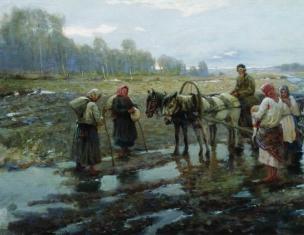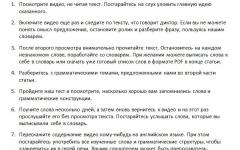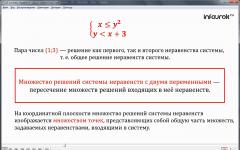.English participle, depending on the context, it correlates with the participle (what? what is doing?) and the gerund (what is doing? what is having done?) in Russian.
- Doing what?(like a Russian gerund)
- I always sing while cleaning the house. – I always sing when I clean (clean) the house.
- Which?(like Russian participle)
- I have read a story written by my son. – I read a story written by my son.
Particle not always comes before communion which it refers to.
- Not being able to swim, Ann was afraid to get in the water.– Not knowing how to swim, Ann was afraid to go into the water.
- She was looking out the window not paying attention to our conversation.“She looked out the window, not paying attention to our conversation.
Participle forms
Present participle
Present participle(Present Participle or Participle 1) has two aspect forms in the active and passive voices. It is formed by adding the ending -ing to semantic verbs or to auxiliary verbs to be, to have.
Uncertain Communion(Indefinite Participle I) in the active and passive voices expresses an action that occurs simultaneously with another action, which is expressed by a predicate verb. It can also indicate an action whose timing is unknown or unimportant.
- Active voice
- Who is this crying boy? -Who is this crying boy?
- While listening to his stories, Kate couldn’t help laughing.“Listening to his stories, Kate couldn’t help but laugh.
- Passive voice
- Being written in pencil the text was difficult to read.– It was difficult to read the text because it was written in pencil.
- Being left alone in the house Ann didn’t know what to do.– Anne, who was left alone at home, did not know what to do.
Perfect participle(Perfect Participle I) in the active and passive voices expresses an action that occurred before another action expressed by the predicate verb.
- Active voice
- Nancy and Mark, having washed their hands, sat down at the table.– Nancy and Mark, having washed their hands, sat down at the table.
- Having been friends at school we still keep in touch.– We were friends at school and still keep in touch with each other. (literally: being friends at school...)
- Passive voice
- Having been cheated once Michael doesn’t trust anyone.– Since Michael has already been deceived once, he doesn’t trust anyone. (literally: having once been deceived...)
- Not having been informed beforehand I didn’t know when to come to the meeting.– Since I was not notified in advance, I did not know when to come to the meeting. (literally: without being informed...)
Uncertain Communion used instead perfect communion with verbs of perception and movement, even if this action expresses precedence another action.
- Arriving at the hotel we could relax at last.– Arriving at the hotel, we were finally able to relax.
- Hearing someone coming Jack rushed to hide his diary.– Hearing that someone was coming, Jack rushed to hide his diary.
- Entering the shop Clark stood a bit in the doorway and then went to the cashier.– Entering the store, Clark stood in the aisle for a while and then went to the cashier.
Past participle
Past participle(Past Participle or Participle II) has only one form and is not divided into active and passive voices.
The past participle of regular verbs is formed by adding the ending - . For irregular verbs the third form of the verb from the table of irregular verbs is used.
- She is a girl loved by everyone.“She is the girl everyone loves.”
- The homework done by Matt was full of mistakes.- IN homework, completed by Matt, was full of errors.
- The book written by Hugh became a bestseller.– The book written by Hugh became a bestseller.
Use of participles
For the formation of tenses and passives
Present participle(Participle I) is used to form the tenses Present Continuous, Past Continuous, Future Continuous, as well as Present Perfect Continuous, Past Perfect Continuous and Future Perfect Continuous.
- Jack is studying now.– Jack is studying now.
- She will be working at 8a.m. tomorrow.– Tomorrow at 8 am she will work.
- We have been living here for 10 years already.– We have been living here for 10 years.
Past participle(Past Participle or Participle II) is used to form the tense forms Present Perfect, Past Perfect and Future Perfect and the passive voice (this is the third form of the verb).
- I have finished my work a long time ago.– I finished my work a long time ago.
- My cup is broken so may I use yours?“My cup is broken, so can I take yours?”
- She said she would have written that article by Tuesday. She said she would write the article by Tuesday.
As a definition
Participles in a sentence can act as a definition of a noun or pronoun. They can appear either before or after the word they refer to. This function is most often used indefinite participle present time in active voice and past participle.
- Present participle
- Approaching bus was already full.– The arriving bus was already packed.
- Those working men look tired.– Those working men look tired.
- We took the road leading to the castle.– We followed the road leading to the castle.
- Past participle
- Faded leaves covered my garden.— Withered leaves covered my garden.
- She threw away the chair broken by me.“She threw out the chair I broke.
- The problem discussed at the meeting was related to our department.– The issue discussed at the meeting concerned our department.
As circumstances
Participles can act in a sentence as circumstances of time, reason, comparison. No conjunctions used present participle, as well as its perfect and passive forms.
- Having finished the task Jack could go home.– Having completed the task, Jack could go home.
- Reading a newspaper she didn’t pay attention to her children.– While reading the newspaper, she did not pay attention to her children.
- Having been broken in several places the vase was thrown away.– The vase was thrown away because it was broken in several places.
Past participle acts as a circumstance in a sentence when it comes after conjunctions when(When), while(while), if(If), as if(as if), as though(as if) though(Although).
- He fell as if hit by someone.“He fell as if someone had hit him.”
- When questioned about her boyfriend Kate blushed.– When asked about her boyfriend, Kate blushed.
- He told me his secret which, if discovered by others, would destroy his life.“He told me his secret, which will ruin his life if others find out about it.”
Compound predicate
Participles in a sentence they can act as a nominal part of a compound predicate. In this function it is used in the active voice and past participle. In this case present participle used infrequently, in Russian it is mainly translated using adjectives.
- Past participle
- The door is locked.- The door is locked.
- I have no money. I "m broken.- I have no money. I'm broke.
- Present participle
- This situation is just terrifying!– This situation is simply scary (frightening)!
- The whole day has been humiliating.“This whole day was humiliating.
Here you can find the English Participle.
PARTICIPLE (THE PARTICIPLE)
1. Participle is an impersonal form of a verb that has the characteristics of a verb, adjective and adverb. In Russian, the English participle corresponds to both participle and gerund.
Like the verb, participle in English has tense forms (and the participle of transitive verbs also has passive forms) and can be determined by an adverb:
A well-bred woman does nothing which shall make people talk of her.
A well-mannered woman does not do anything that will make people talk about her (discuss her).
Like an adjective, a participle can perform the functions of a determiner and a nominal part of the predicate in a sentence:
The first International Conference of Physicians for the Prevention of Nuclear War held in March 1981 was attended by doctors from 11 countries.
At the First International Conference “Doctors for the Prevention of nuclear war", held in March 1981, was attended by doctors from 11 countries.
Participle forms
Present participle (The Present Participle, Participle I)
2. The present participle is formed by adding the suffix -ing to the infinitive of a verb without the particle to:
Before the suffix -ing, one consonant, if it comes after a short stressed vowel, is doubled:
to get - getting
to run - running
to compel force - compelling
to prefer - preferring
In the verbs to die, to lie, to tie, the letter i before the suffix -ing becomes y:
to die-dying - dying, dying
to lie-lying - lying, lying
to tie-tying - tying, tying
The present participle is translated into Russian either by a real present participle or a gerund.
Past Participle (The Past Participle, Participle II)
3. The past participle of regular verbs is formed by adding the suffix -ed to the infinitive of the verb without the particle to. This suffix is read in the same way as the -ed suffix of the past indefinite tense of regular verbs.
to finish -finished finished
to civilize -civilized civilized
The past participle of irregular verbs is most often formed by changing the root vowel or the entire stem of the verb:
to write - written written
to see - seen seen
to teach - taught
In dictionaries, after the indefinite form of irregular verbs, the forms of the past indefinite tense and the past participle are usually given.
In Russian, the past participle is usually translated into a passive participle of the perfect or imperfect form.
The Perfect Participle
4. The perfect participle expresses an action that precedes the action expressed by the predicate verb. It is formed from the present participle of the verb to have - having and the past participle of the semantic verb.
The perfect participle is most often translated into Russian as the perfect participle.
to say - having said
to write - having written
Functions of participles in a sentence
5. The present participle can be used in a sentence in the following functions:
a. Nominal part of the predicate:
I looked at the bookshelf: one book was missing.
I looked at the bookshelf: one book was missing.
b. Definitions:
Women from 111 countries and belonging to 132 national organizations took part in the meeting in Prague in 1986.
Women belonging to 132 national organizations from 111 countries took part in the meeting, which took place in Prague in 1986.
c. Circumstances:
Knowing English well he was able to read this magazine.
Knowing English well, he was able to read this magazine.
d. Combined with forms auxiliary verb to be the present participle forms continuous tenses:
In a large, hot, richly-furnished drawing-room two women were sitting.
Two women were sitting in a large, stuffy, richly furnished living room.
6. The past participle can be used in a sentence in the following functions:
a. Nominal part of the predicate:
Russia's climate is as varied as its scenery.
Russia's climate is as varied as its landscape.
b. Definitions:
The Professor did not exaggarate when he spoke of the widespread interest excited by his new psycho-physiological experiment.
The professor was not exaggerating when he spoke of the widespread interest caused by his new psycho-physiological experiment.
c. Circumstances:
When discussed by the meeting the Appeal to All the Women of the World was adopted by it.
After the “Appeal to All Women of the World” was discussed by the meeting, it was adopted.
d. In combination with forms of the auxiliary verb to be, the past participle forms the forms of the passive voice:
The flat of Hercule Poirot was furnished in a modern style.
Hercule Poirot's apartment was furnished in a modern style.
e. In combination with forms of the auxiliary verb to have, the past participle forms perfect tenses:
Europe has twice this century been the scene of a destructive war that has spread to global proportion.
During this century, Europe was twice the site of a devastating war that spread throughout the world.
7. The perfect participle is used in a sentence as a function of circumstances:
Having done the question-and-answer exercises, the students began to write a composition.
After completing the question-and-answer exercises, students began writing an essay.
Which combines the characteristics of a verb, adjective and adverb. In Russian it corresponds to participle and gerund: doing- doing, doing; opening- opening, opening; done- made; opened- open.
Possessing the properties of an adjective and an adverb, a participle in a sentence can serve as a definition or circumstance. Verbal properties are manifested in the fact that a participle can have a direct object.
Please note that the participle is also part of complex verb forms (that is, it is used in the formation of various tenses in the active and passive voice).English participles are divided into:
- present participles (Present Participle or Participle I).
- past participles (Past Participle or Participle II).
Participle forms
Negative participle forms are formed using a particle not, which is placed before the participle: not asking- without asking, not broken- not broken.
Present participle. Participle I
The present participle (Present Participle or Participle I) has two forms:
- Present Participle Simple (simple participle).
- Present Participle Perfect (perfect participle).
Simple participle. Present Participle Simple
Present Participle Simple(simple present participle) corresponds to the Russian present participle (reading, building) and the imperfective participle (reading, building).
This form is formed by adding the ending -ing to the verb stem:
read + ing - reading - reading, reading
build + ing - building - building, building
In passive voice - being + III form of the verb:
being read - readable, being readable (i.e. when it was read)
being built - being built, being under construction (i.e. when it was built)
Examples of sentences with simple participles:
Everybody looked at the dancing girl. — Everyone looked at the dancing girl.
The speaking doll interested the child very much. — The child was very interested in the talking doll.
Traveling in America, I saw a lot of interesting things. — Traveling around America, I saw a lot of interesting things.
The house being built in our street is very good. — The house being built on our street is very good (the house that is being built). - passive voice
Perfect participle. Present Participle Perfect
Present Participle Perfect(present perfect participle) corresponds to the Russian perfect participle (read, constructed).
It is formed according to the following formula - having + III form of the verb:
having read - having read
having built - having built
In passive voice - having been + III form of the verb:
having been read - having been read (i.e. when it was read)
having been built - having been built (i.e. when it was built)
Examples of sentences with the perfect participle:
Having prescribed the medicine, the doctor went away. — Having prescribed the medicine, the doctor left.
Having drunk a cup of tea, she felt better. — After drinking a cup of tea, she felt better.
Having been shown the wrong direction, the travelers soon lost their way. — Since the travelers were shown the wrong direction, they soon got lost. - passive voice
Past participle. Participle II
Past participle(Past Participle or Participle II) is the III form of the verb and corresponds to the Russian passive past participle (read, constructed). Participle II has only the passive voice form.
The past participle is III verb form:
read - read
built - built
opened - open
invited - invited
The third form of irregular verbs must be remembered!
Present Participle - Participle in English
The Participle ["pα:tsıpl]
A participle is an impersonal form of a verb, combining the properties of a verb, an adjective and an adverb. In Russian it corresponds to participle and gerund (in English there is no separate form corresponding to the Russian gerund).
In English there is two participles:
1) Participle I (Participle I or Present Participle) - present participle. Has two forms :
A) Present Participle Simple Tense. Corresponds to the Russian present participle and imperfective participle: reading- reading, reading, resting - vacationer, resting;
b) Present Participle Perfect. Corresponds to the Russian perfect participle: having written - having written, having read - after reading.
2) Participle II (Participle II or Past Participle) - past participle. The participle of transitive verbs corresponds to the Russian passive past participle: opened -open,dressed -dressed, made -made.
The English participle has the properties adjective , adverbs And verb .
How adjective , the participle performs the function of defining a noun in a sentence and corresponds Russian Communion :
A broken cup lay on the floor. - Broken the cup was lying on the floor.
How adverb , the participle performs the function of a circumstance that determines the action expressed by the predicate and corresponds Russian participle :
Verbal the properties of the participle are expressed in the fact that it can have a direct object:
Entering the room he found all the pupils present. - Upon entering into the room, he saw that all the students were present.
and can be defined by an adverb:
He liked the rest in the evening walking slowly in the park. - He liked to relax in the evening, walking slow in the park.
| View | (Active) Active voice | (Passive) Passive voice | |||
| Auxiliary verb | Semantic verb | Auxiliary verb | Semantic verb | ||
| Participle I | Present Participle Simple Tense | - | IV | being | III |
| asking -asking; asking(at all) | being asked - asked; being asked(at all) | ||||
| Present Participle Perfect | having | III | having been | III | |
| having asked - asking (shi), (already, before something) | having been asked - (already) has been asked | ||||
| Participle II (Past Participle) | ---- | - | III | ||
| asked - asked, asked | |||||
Intransitive verbs have no forms Passive voice.
Let's remember that: Transitive verbs are verbs that express actions that can move to a subject and answer a question. who?, what? . For example: see, drop.
Intransitive verbs are verbs that express actions that do not directly transfer to an object or person. For example: live, cry, sit. Such verbs are used only in the active voice.
Many English verbs are transitive in one of their several meanings and intransitive in another, for example: burn - burn(transitive) / burn(intransitive); sit - plant(transitive) / sit(intransitive).
Formation of participle forms
Present Participle Simple (Active) Tense- simple form, formed by adding the ending -ing to the original form of the verb, ( , or IV form);
Present Participle Simple (Passive) Tense to be being and a semantic verb in the form Past Participle (or III form).
Present Participle Perfect (Active)- formed using an auxiliary verb to have in the form of Present Participle Simple, namely - having -ed or III form);
Present Participle Perfect (Passive)- formed using an auxiliary verb to be in the form of Present Participle Perfect, namely - having been and the semantic verb in the Past Participle form (form with -ed or III form).
Participle II (Past Participle)- has only one form of collateral ( Passive). By type of education it is III verb form or -ed form.
Negative participle forms are formed by placing a particle not before the sacrament, for example: not asking - without asking,not seen - invisible,not being read - unread.
Present Participle Simple
or simply Participle I (present participle)
Participle I or the present participle in the active voice has a simple form with a characteristic ing- ending and in the passive voice - a complex form with ing- ending shifted to an auxiliary verb.
| Active | Passive | |
| Participle I | ask ing | being ask ed |
This form is used regardless of the tense in which the predicate stands, expressing only simultaneity with an action expressed by a predicate verb. In a sentence, Participle I (Active and Passive) performs the function of a modifier or circumstance.
Active voice
Can convey the following temporary relationships:
a) Expresses simultaneity with an action expressed by the predicate verb of a sentence in the present, past or future. Name - " present participle" is thus purely conditional. For example:
b) Participles in the role of adverbial circumstances, formed from verbs of physical perception and movement, can denote action preceding an action expressed by the predicate verb of a sentence, that is, an action usually conveyed by the form Perfect Participle I.
c) Can express an action related to present time ( moment of speech ) regardless of what tense the verb-predicate of the sentence is in or used whatever by time. For example:
As a definition
As a definition of a noun ( Which? which? which? ) Participle I characterizes a person or thing through its action. Unlike the gerund, which has the same form, it is not preceded by a preposition.
It can be found both before the defined noun (single participle) and after the defined noun (with words dependent on it, forming a participial phrase).
1) Before a noun, as a verbal adjective. It is translated into Russian by the present or past participle and shows that the described object or person itself performs the action:
In this case, the defined noun must be a person or thing that can itself carry out the action expressed by the participle. Otherwise, this verb form will be a gerund, for example:
| (participle I) boiling water | boiling water |
| (gerund) the boiling point | dotboiling |
2) After a noun, where the participle I, together with the words related to it, forms a attributive participial phrase. Translated into Russian by a participle or predicate of a subordinate attributive clause introduced by the word which . Unlike participial phrases in Russian, attributive participial phrases in English. In languages, commas are not usually used.
Attributive participial phrases must immediately follow the noun to which they refer; violation of this rule leads to a change in the meaning of the statement:
| This is the sister of my friend living next door to me. | This is my friend's sister living in the next apartment. |
| This is my friend's sister living next door to me. | This is my friend's sister living in the next apartment. |
Note: Participial attributive phrases are used in cases when actions expressed by the predicate verb of the sentence and the participle occur simultaneously .
Can you see the girl dancing with your brother? - You you see girl, dancing with your brother?
The boys throwing stones into the pond laughed loudly. - boys, those who quit stones in the pond, loud laughed.
If these actions occur not at the same time , then when translating a Russian participial phrase into English, it should be translated by a defining subordinate clause with a predicate in the required tense:
In the first sentence: one action is in the present, the second action is " smashed" in the past. In the second sentence, both actions are in the past, but they are not simultaneous - first " threw", then they finished and another action began - " let's go home".
As circumstances
In the role of adverbial participle I explains when?, why?, for what reason?, how?, under what circumstances? etc. the main action, expressed by the predicate verb of the sentence, occurs. Used:
1) In participial phrases to express circumstances time . It can appear at the beginning or end of a sentence; it is usually translated into Russian by an imperfect gerund or a predicate of a subordinate clause introduced by words when, since, although etc. (usually when it is difficult for us to form a Russian gerund from the word being translated, for example from the words write, bake etc.).
With some verbs, the participle can also express precedence, then it is translated by the perfect participle:
In this case, the participle is often introduced by conjunctions when When And while while, while, which are usually not translated into Russian. Union when is used when we are talking about an ordinary, repeated action, and the conjunction while then, when talking about a one-time action, more often as a process occurring simultaneously with the action of the predicate verb. The choice often depends on whether we want to convey simply a fact - with when, or emphasize the duration - s while(as in the case of using Continuous forms).
Please note: Participle I of the verb to be - being not used in phrases expressing the circumstance of time. Therefore it should be translated:
Please note that after when/while Communion being simply omitted and can be translated: When/While a child… - As a child..., When/While in Moscow… - When I was in Moscow....
Being, however, is used in phrases expressing the circumstance of the cause:
2) In participial phrases to express circumstances reasons , most often with participles formed from verbs of thinking, emotions, for example: knowing knowing, remembering remembering, hoping hoping etc., as well as being being and having having:
Let us remember that the participle being here denotes the reason for the action, and not the circumstance of time (which means that, for example, the expression Being a student, she... is translated Since she was a student, she..., not Then (at the time) when she was a student, she...; the last expression can be translated - When/While a student, she…):
3) To express circumstances course of action or accompanying circumstances (actions) . The participle or participial phrase in this case expresses second, accompanying action which occurs simultaneously with the main action expressed by the predicate verb, or immediately precedes to him.
Please note: If behind the verb ing-the form at the beginning of the sentence follows the predicate - then this is a gerund, for example: Reading helps us...- Reading helps us ….
Such phrases during translation cannot be replaced by a subordinate clause, but the participle can be replaced, without damaging the meaning, by a second predicate. It’s just that in English the participle in such cases is more common than the second predicate.
The participial phrase expressing the second action is usually not separated by a comma if it is at the beginning of the sentence and, most often, is highlighted if it is at the end of the sentence. A comma is placed obligatory only when there is a possibility of taking the participle as a definition of the word to the left of it. For example:
The second action immediately preceding an action expressed by the predicate verb of a sentence can be expressed by Participle I and is usually translated by a perfect gerund. Often used with participles formed from verbs of motion and others, for example:
The second, as well as the third, action, expressed by Participle I, can immediately follow the action of the predicate verb (usually it is quite clear from the situation or context how they occurred):
Participle I, in addition, is part of complex verb forms:
Participle I (present participle) is used as a semantic verb in complex verb forms of the active voice (Active Voice): Continuous And Perfect Continuous. Let us remember that all these forms are formed from the combination of the auxiliary verb to be(in the appropriate conjugation) + semantic verb in the form of Participle I (aka IV form of the verb or ing- form). For example:
Passive voice
Participle I in this form expresses an action experienced by the person or object to which the participle refers.
1) In the role definitions to a noun is used in participial phrases corresponding to subordinate clauses with a verb in the passive voice. Here Participle I is used to express actions taking place at the present moment or in the present period of time. Usually translated by the Russian passive present participle:
2) In the role circumstances (time and reason). Adverbial phrases with complex forms of participles in the passive voice are usually translated into Russian by subordinate adverbial clauses with conjunctions When; because; after etc., and the participle itself is translated by the predicate of the subordinate clause.
In the function of circumstance, Participle I (Passive) corresponds to the Russian form of the gerund, for example: being asked, being broken, being written - being asked, being broken, being written. However, this form is rarely used, and in modern Russian a subordinate clause is used here.
Share a link to this page on your favorite social network: Send a link to this page to friends| Views 15435 |Today on the agenda is a rather difficult, at first glance, topic - communions. However, if you think carefully, everything turns out to be quite simple. Let's get started! Participle in English
The participle combines the grammatical attributes of several parts of speech at once - an adverb, an adjective and the verb itself. From the latter he got the ability to have voices (Active or Passive) and a direct object.
- The student delivering the report (= explains sign, student – Which? – reading report) isn't 't accurate .
- Andrew was angry asking (= angry – V Which moment? – When asked O price) his wife about true price of her purple dress .
- The delivered report (= indicates an action performed on the message: what was done with the message? – read) was fabulous .
They are used to form the following shapes:
Charlotte is marking political boundaries on the contoured map at the moment ( The Present Continuous ).
Charlotte has already marked a great number of countries ( The Present Perfect ).
Charlotte has been marking political boundaries for two hours ( ).
How to form them?
For convenience, look at the table. The numbers correspond to the type and voice of the participle.
| View | Active | Passive | |
|---|---|---|---|
| Participle I | Simple | Infinitive + -ing (1) | Be + -ing + V3 (2) |
| Perfect | Have + -ing + V3 (3) | Have + -ing + been + V3 (4) | |
| Participle II | V3 (5) |
1. Infinitive + —ing
- Do – doing;
- Catch – catching.
This form is IV verbal. It indicates that the action is carried out at the same time as the action expressed by the predicate.
While cooking Eva usually uses an old recipe book (Cooking, Eva usually uses old bookrecipes).
In this case, you should pay attention to the following points:
- the unreadable letter e disappears (make – making);
- readable – remains (see – seeing);
- the letter combination -ie is transformed into -y (lie – lying);
- the final -y does not change (try – trying);
- in the case when the last syllable is stressed, the consonant is doubled (beg – begging, admit – admitting);
- when the last syllable is unstressed, the consonant is not doubled (suffer – suffering).
2. Be + -ing + V3
Since the voice is passive, we remember that the action is performed on the object, and not the object itself produces it.
- Paint – being painted;
- Draw – being drawn.
Being built of stone the monument could withstand hundreds of attacks (Being built of stone, the castle could withstand hundreds of attacks).
3. Have + -ing + V3
- Tie – having tied;
- Go – having gone.
Having watched the film he went to his aunt (After watching the film, he went to his aunt).
The example shows that the first action precedes the second. Thus, the perfect participle means that the action of the predicate takes place later than it in time.
4. Have + -ing + been + V3
- Open – having been opened;
- Make – having been made.
Having been sent on Friday, the letter reached him on time (Since the letter was sent on Friday, it reached him on time).
Units of this type are mainly used in participial phrases to express a causal circumstance. In this case, the action of the participle precedes the action of the main semantic verb. Rarely used in spoken language.
V3
- Solve – solved;
- Catch – caught.
It signals the completion of the action.
Lost time is never found again (You can’t get back lost time).
The book thrown by Adam broke the window (The book thrown by Adam broke the window.)
How not to confuse participle and gerund?
To distinguish between these parts of speech, it is necessary to remember that







